
The Syngnathidae is a family of fish which includes seahorses, pipefishes, and seadragons. The name is derived from Greek, σύν (syn), meaning "together", and γνάθος (gnathos), meaning "jaw". This fused jaw trait is something the entire family has in common.

Pipefishes or pipe-fishes (Syngnathinae) are a subfamily of small fishes, which, together with the seahorses and seadragons, form the family Syngnathidae.

Syngnathus is a genus of fish in the family Syngnathidae found in marine, brackish and sometimes fresh waters of the Atlantic, Indian and Pacific Ocean. Fossils of these species are found from the Oligocene to the Pleistocene. They are known from various localities of Greece, Italy, Germany and United States.

The greater pipefish is a pipefish of the family Syngnathidae. It is a seawater fish and the type species of the genus Syngnathus.
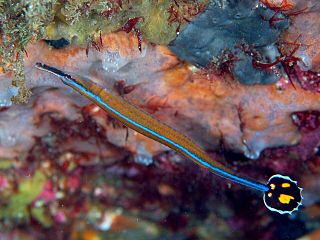
Doryrhamphus and Dunckerocampus, popularly known as flagtail pipefish, are two genera of fishes in the family Syngnathidae. They are found in warm, relatively shallow waters of the Indo-Pacific, with a single species, D. paulus, in the eastern Pacific. Most of these pipefishes are very colourful, and are fairly popular in the marine aquarium hobby despite requiring special care and not being recommended for beginners.

Corythoichthys is a genus of pipefishes of the family Syngnathidae. All species in the genus are found in the tropical Indian and Pacific Oceans on reefs or rubble bottoms. Relationships and taxonomy within the genus are still in debate, but there may be at least 23 species.

Dunckerocampus is a genus of pipefishes one of two genera known as the flagtail pipefishes. This genus is native to the Indian and Pacific Oceans where they are usually found in reef environments. These species are elongated and have a maximum length between 10 and 20 centimetres, with D. chapmani being the only species with a maximum length below 15 centimetres (5.9 in). Their tail is red with a whitish edge, and in some species there is a white or yellow spot in the center. All except D. baldwini have vertical red/brown and yellow/white stripes on their body.

The Hippocampinae are a subfamily of small marine fishes in the family Syngnathidae. Depending on the classification system used, it comprises either seahorses and pygmy pipehorses, or only seahorses.

The straightnose pipefish is a species of pipefish which lives in brackish water in the northeastern Atlantic, the Baltic, Mediterranean and Black Sea.
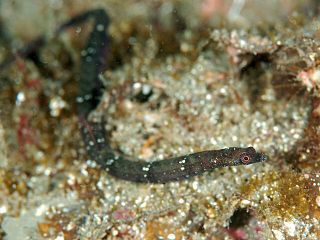
Halicampus is a genus of pipefishes of the family Syngnathidae, containing 12 described species.
The long-tailed ghost pipefish or armored ghost pipefish(Solenostomus armatus) is a ghost pipefish in the family Solenostomidae. The species name comes from the Greek armatura, referring to this fish's armor of dermal plates. Solenostomus leptosoma is now considered a synonym of S. armatus, the valid species identification.
Hippichthys is a genus of pipefishes native to the Indian and Pacific Oceans and the landmasses around them. This genus contains freshwater, brackish water and marine species.
Bhanotia is a genus of pipefishes native to the Indian and Pacific Oceans.

Bulbonaricus is a genus of pipefishes native to the Indian and Pacific Oceans.
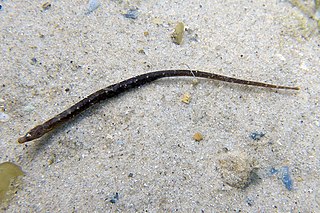
Campichthys is a genus of pipefishes native to the Indian and Pacific Oceans.
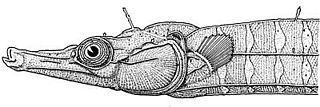
Cosmocampus is a genus of pipefishes.
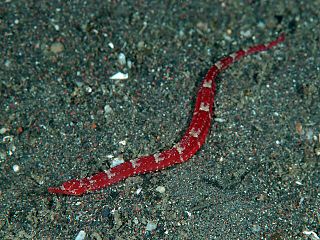
Festucalex is a genus of fish in the family Syngnathidae native to the Indian and Pacific Ocean.
Polyandry in fish is a mating system where females mate with multiple males within one mating season. This type of mating exists in a variety of animal species. Polyandry has been found in both oviparous and viviparous bony fish and sharks. General examples of polyandry occur in fish species, such as green swordtails and Trinidadian guppies. Specific types of polyandry have also been classified, such as classical polyandry in pipefish cooperative polyandry in cichlids and convenience polyandry in sharks.

Pregnancy has been traditionally defined as the period of time eggs are incubated in the body after egg-sperm union. Although the term often refers to placental mammals, it has also been used in the titles of many international, peer-reviewed, scientific articles on fish, e.g. Consistent with this definition, there are several modes of reproduction in fish, providing different amounts of parental care. In ovoviviparity, there is internal fertilization and the young are born live but there is no placental connection or significant trophic (feeding) interaction; the mother's body maintains gas exchange but the unborn young are nourished by egg yolk. There are two types of viviparity in fish. In histotrophic viviparity, the zygotes develop in the female's oviducts, but she provides no direct nutrition; the embryos survive by eating her eggs or their unborn siblings. In hemotrophic viviparity, the zygotes are retained within the female and are provided with nutrients by her, often through some form of placenta.
Choeroichthys latispinosus, also known as the Muiron Island pipefish or Muiron pipefish, is a species of pipefish native to the western coast of Western Australia, named for the its recorded sighting on South Murion Island. It is thought to inhabit the area from Port Denison to Brecknock Island in the eastern Kimberley region.












